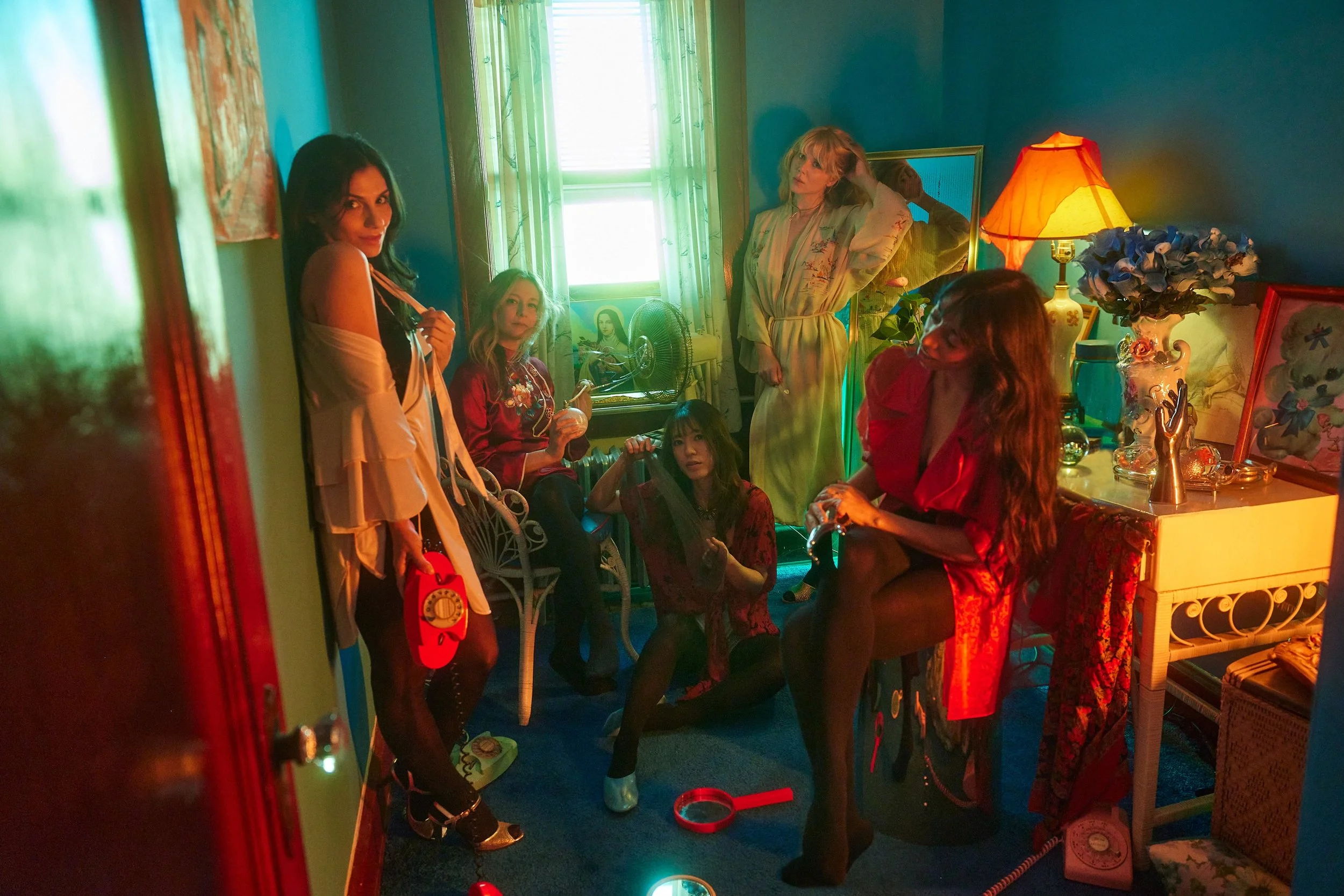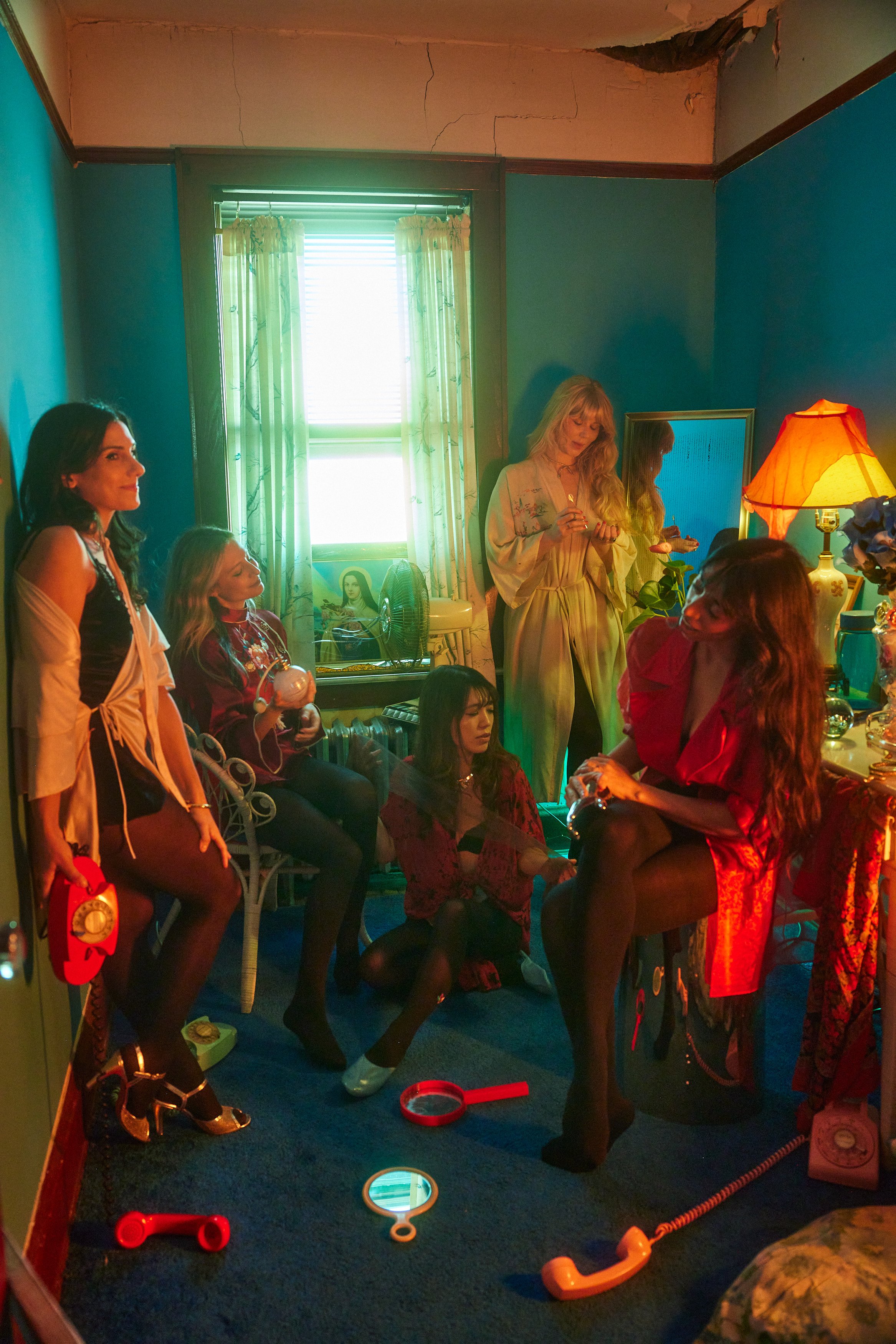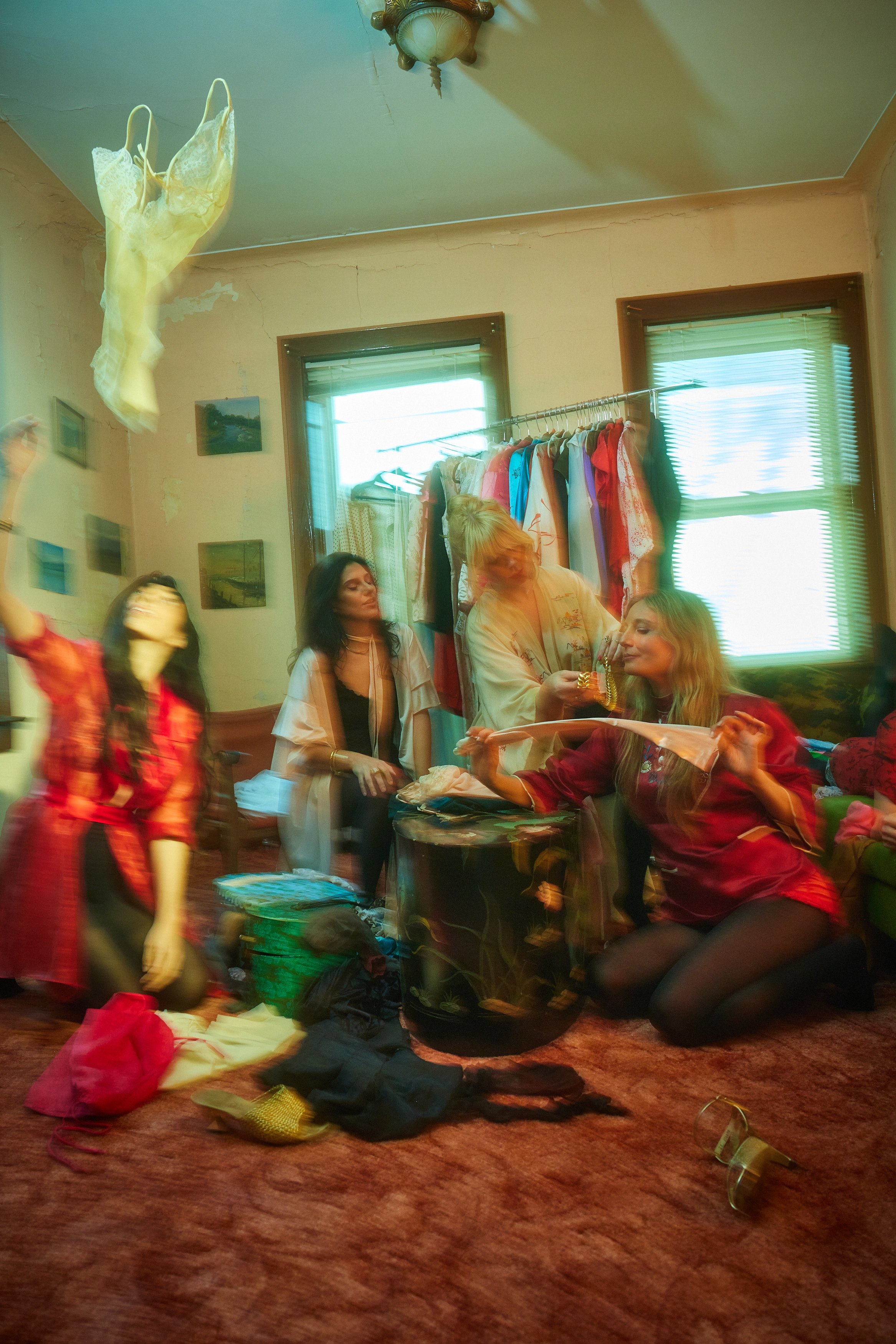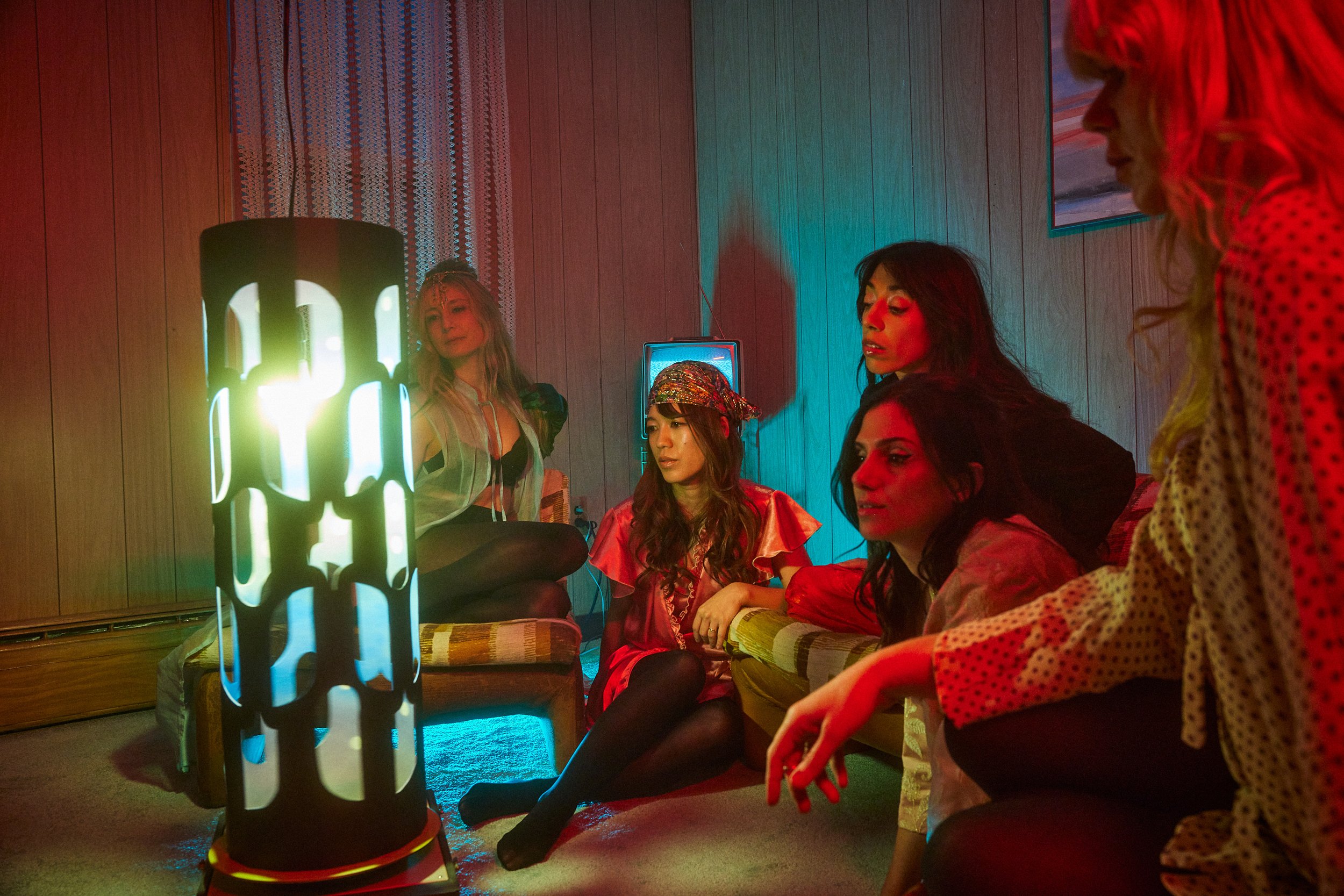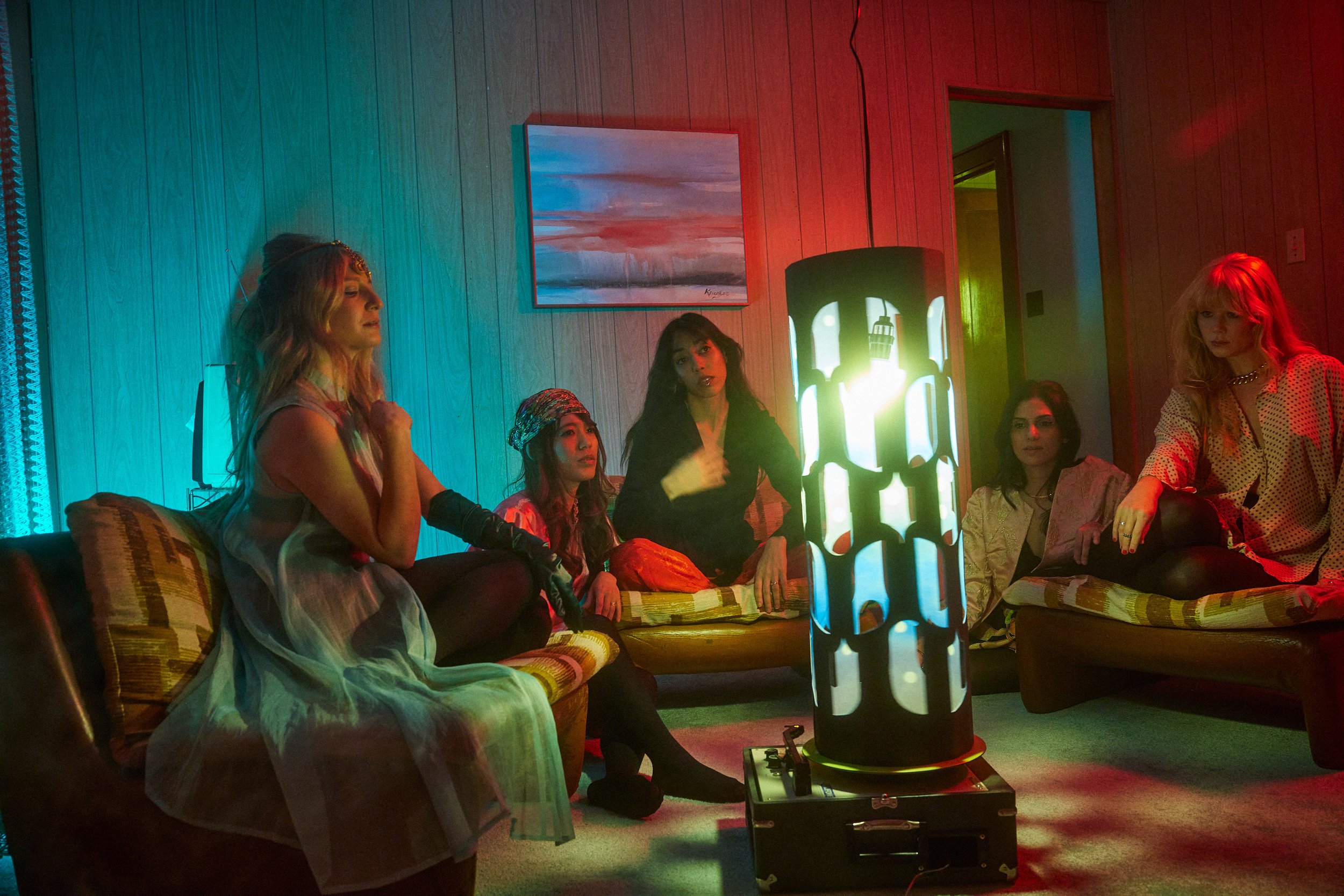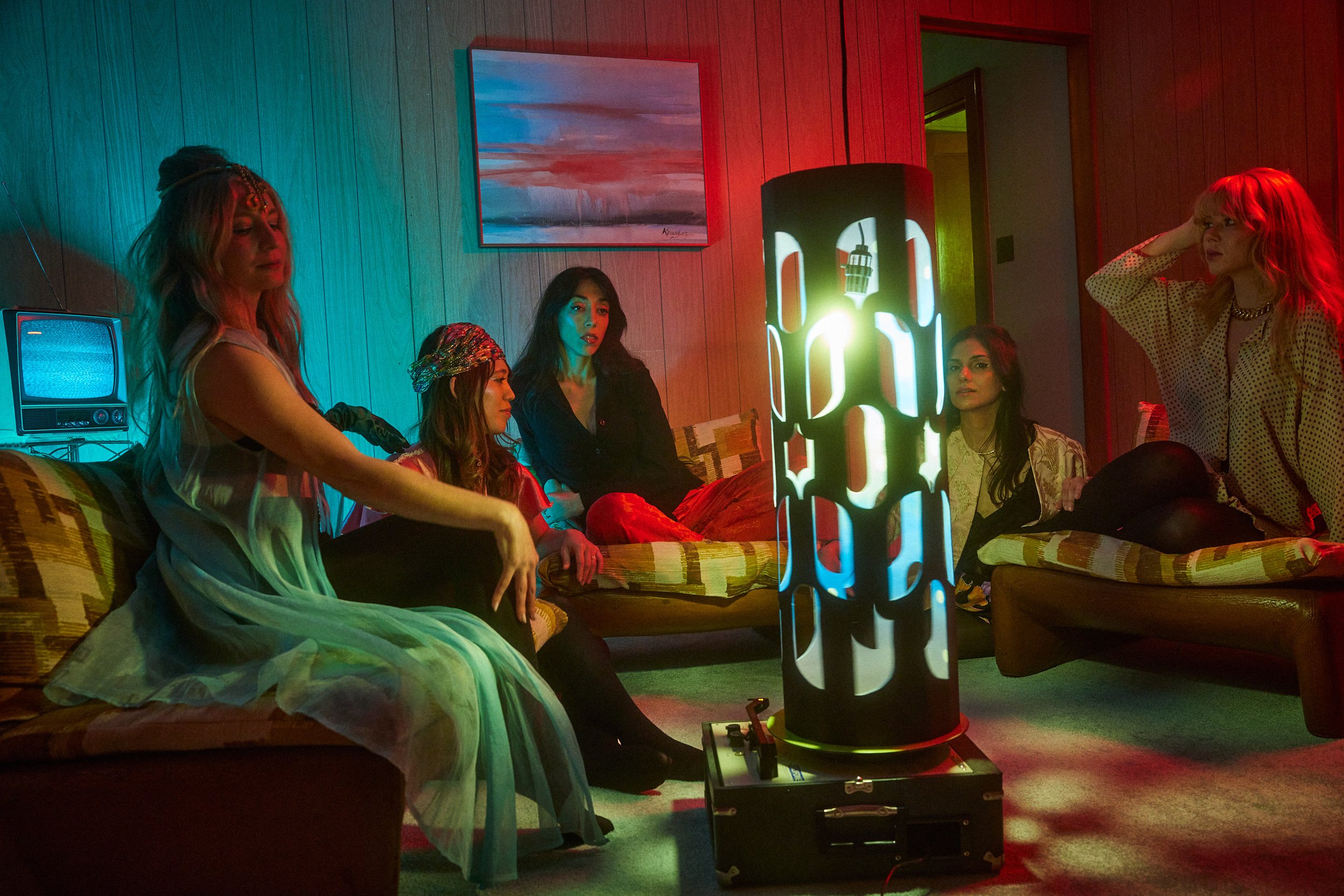Click Image to Download!
“There’s always a desire for transcendence in our music,” says Habibi’s Rahill Jamalifard, “a desire to go beyond our limitations. Whether it’s spiritual or physical or emotional, it feels like this album really embodies that search for something more.”
Indeed, Dreamachine, Habibi’s mesmerizing new record releasing on Kill Rock Stars, is a work of sonic transcendence itself, a genre-bending swirl of analog and digital elements that rises beyond the critically acclaimed five-piece’s garage rock roots to arrive at a singular, spellbinding sound they’ve been chasing for more than a decade. Produced by Tyler Love and longtime collaborator Jay Heiselmann and featuring MGMT multi-instrumentalist James Richardson, the collection draws on a mix of post-punk, experimental pop, and vintage disco, calling to mind everything from Tom Verlaine and Diana Ross to Kate Bush and Kim Deal, all filtered through the band’s shared love of Middle Eastern psych music. The songs here are their own distinct worlds, each an immersive quest in pursuit of something greater, and the band’s performances are relentless and hypnotic to match, driven by lush synthesizers, sinewy guitars, and a muscular rhythm section. The result is a record as fearless as it is enthralling, an alternatingly fierce and joyous work that ascends to new heights as it reckons with desire and escape, love and surrender, rebellion and reality.
“So much of this album is about getting out of the chaos of your life and reorganizing your mind,” explains Lenny Lynch. “Maybe it’s blasting off in a spaceship, maybe it’s getting out on the dancefloor. Everybody’s got so much anxiety about the future right now, but it’s so important, even if it’s only for a moment, to find ways to be present in your body and know that you’re going to be alright.”
Co-founded by Detroit natives Jamalifard (lead vocals, synth) and Lynch (guitar, synth, backup vocals), Habibi got its start in Brooklyn in 2011, turning heads immediately with their blistering blend of eras and cultures. The group’s 2014 self-titled debut was a critical smash, praised by The New Yorker for infusing “the Colgate-white glisten of sixties-girl-group pop with an uncensored edge” and prompting NME to hail them as “one of New York’s most exciting bands.” Pitchfork raved that their 2018 follow-up EP, Cardamom Garden, “shed rigid definitions of what constitutes American music” with its mix of psych-rock and Iranian folklore (complete with lyrics sung in Farsi), and NPR’s All Things Considered profiled the band around the release of their sophomore full-length, 2020’s Anywhere But Here, which explored darker, more portentous sonic territory.
“Out of the gate, a lot of people associated us with a sort of bubblegum, sweet and innocent sound,” reflects Lynch. “As we got older and the world got weirder, I think the music got a bit more ominous with it.”
Rather than succumb to the darkness, though, Habibi endeavored to rise above it on Dreamachine, with Jamalifard and Lynch composing much of the music in jubilant, collaborative sessions with the latest and most cohesive incarnation of the band: Lyla Vander (drums), Yukary Morishima (bass), and Ana Becker (guitar).
“We’ve been on the road together as a unit for a long time now, so to be able to bring that camaraderie into the studio made everything totally seamless,” says Lynch, who shared a house upstate with her bandmates for much of lockdown. “I’d walk in and hear a bass line and drum groove coming from the basement and I just couldn’t wait to join in.”
When it came time to record, the band set up shop at Love’s newly built Taconic Studios in the upstate village of Red Hook, New York, for a series of loose, experimental sessions that allowed them to stretch their boundaries and explore the songs from a variety of perspectives.
“Over the years, we’ve recorded just about everywhere you could imagine, from DIY basements to fancy studios, but working at Taconic on this record felt like the best of both worlds,” Jamalifard explains. “We had access to all this incredible gear, but also the comfort of being in an old friend’s house, so we felt completely free to take chances and push ourselves.”
That liberation is plain to hear on Dreamachine, which takes its name from a spinning work of light art popularized as a creativity aid in the 1960s by beat writers like William S. Burroughs and Alan Ginsberg (and later championed by musicians like David Bowie and Paul McCartney).
“I’ve been in a room with these machines a few different times, and each marked a significant moment in my life,” says Jamalifard. “You put it on a turntable at 78rpm and sit in front of the strobing lights, and if you close your eyes, you have this very physical reaction to it. It creates a natural high, and that was exactly what we were aiming for with this record.”
The Dreamachine journey begins, appropriately enough, with the sound of a car engine roaring to life as the band launches into the entrancing “On The Road.” Blending spiritual mysticism with a punk rock sneer, the track serves as an ideal entry point to the record, promising to take us somewhere beyond the physical realm laid out before us while at the same time hinting at the violence and danger perpetually lurking around the periphery of modern existence. The shimmering “In My Dreams” seeks escape in an ethereal world unsullied by reality, while the alluring, lo-fi “POV” leaves heartbreak in the rearview mirror for a redemptive rendezvous in the smoky nightclubs and rain-soaked streets of Paris, and the intimate “My Moon” conjures up the kind of personal connection that surpasses time and distance.
“‘My Moon’ is a song for the hopeless romantics,” says Lynch. “It feels like it really sums up the love language of the entire album.”
Language is integral to the Dreamachine experience, which relies on a blend of Eastern and Western references in its deft lyrical craftsmanship. The eerie “Interlude” recounts an ancient Sufi tale about fate and inevitability passed down through Jamalifard’s family; the trippy “Losing Control” playfully works through a series of escalating internal rhymes to create a chaotic, spiraling effect; and the rough-and-tumble “Fairweather” paints a vivid portrait of loneliness and betrayal through a series of searing visual metaphors. But it’s perhaps the sensual, disco-flavored album closer “Alone Tonight” that best encapsulates the record’s balance of cerebral and corporeal, with the band tossing their woes and worries to the wind for a sultry night on the dancefloor. “I've been on my own for long / Traveling from place to place,” Jamalifard sings. “Makes me kind of hot to be a stranger in a different space / Take myself out on the town / No one even knows my name / I keep to myself just fine but I don't want to be alone tonight.”
“Sometimes joy is super radical, and it might sound trivial to want to feel sexy on a dancefloor, but connecting with your body can be just as important as getting totally heady and lost in constant thought,” Jamalifard explains. “We often think of the search for divinity or refuge or self-understanding as an intellectual one, but it can be very physical, as well.”
Ultimately, that mix is what Dreamachine is all about, taking sounds and cultures and ideas and questions and spinning them all together to carry you off into another dimension. Transcendence comes in many forms; for Habibi, it arrives at 78rpm.

